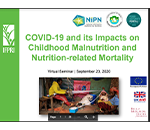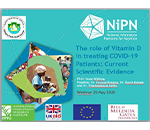PRESENTATIONS

The Ethiopian Public Health Institute (EPHI), IFPRI, NIPN and the Food Security Portal (FSP) Project co-hosted a webinar on 'COVID-19 and it

On May 29, 2020, we have hosted our second webinar on the role of Vitamin D in treating COVID-19 Patients: Current Scientific Evidence. The event included a presentation by Professor Susan J.
NIPN's objective is to provide decision-makers with timely information which can guide the policy process for improved nutrition outcomes. During the COVID-19 pandemic, NIPN has been seeking innovative ways to inform decision-makers, by tapping into its existing partnerships and by taking advantage of webinars to reach a large audience.
Food away from home is becoming more important In HCES 2011, urban areas: 16% of food budget on food eaten away from home for richest quintile, one-quarter of food expenditures Implication for the foodservice sector
Elements of a food systems approach are reflected in the NNP, NSA, Sequota, etc. however, to fully leverage this to inform
implementation, help adapt, and learn from process capacity building and research is needed
Empirical evidence linking ASFs to child growth is varied Handful of ASF interventions do find sizeable growth impacts Nutrition-sensitive livestock interventions also sometimes show signs of impact, but typically also use behavioral interventions Observational studies link growth to livestock ownership (East Africa) Historical studies link adult heights to ASF consumption patterns
Reducing undernutrition is of intrinsic and instrumental value Reducing chronic undernutrition requires investments in nutrition-sensitive social protection and agriculture Existing evidence from Ethiopia and elsewhere indicates that just providing cash or food has limited effects on chronic undernutrition
Develop a research agenda based on identified knowledge gaps At country level push this research agenda: drive the research and not the reverse Keep track of research Organise data storage and demand condition for ethical clearance and committee with EPHI. Organise peer reviews of research protocols before submission to the EC.
Considerable reduction in stunting rates since 2000. One of the fastest reductions in the world little improvement in average birth sizes; 20% are born stunted, calls for focus on maternal health and nutrition In 2016, growth faltering occurs later likely due to improvement in exclusive breastfeeding practices.
The highly skewed crop portfolio of irrigation in parts of Ethiopia toward chat (up to a third of irrigated plots in the study area) needs more attention from policy makers and researchers on its impact on nutritional outcomes and its high water requirement
Pagination
- Page 1
- Next page



